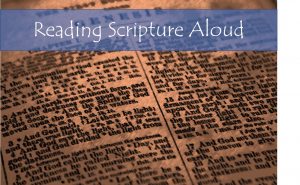
Attempting to read scripture aloud for meaning can be frustrating and even futile for the Lay Reader. A recent article in by John Barton in TIME, Judaism and Christianity Both Rely on the Hebrew Bible. Why Do They Interpret It So Differently? , offers perfect examples as to why this is true.
Different Interpretations
According to Barton, the interpretation of a text often lies outside the text. Different religions, and different denominations within religions, interpret the same text differently. Scripture alone can’t adequately explain what’s believed or what’s practiced by either Christianity or Judaism. Each rely on keys or guides to decode the meaning of the text. The two religions rely on separate bodies of preaching, Midrash, commentary and scholarly writing to reveal different meanings for the same shared texts.
The texts diverge even within denominations as translations, modern versions and editions proliferate. A subtle change in word choice (perhaps in an attempt to be more faithful to the original Greek) can suggest a dramatic reinterpretation. Is that intentional or collateral? Attempting to read a text aloud, in the precious few minutes allowed in the worship service, in such a way as to communicate every nuance in meaning would be a challenge for even the most skillful reader.
Read to experience scripture
That’s why I argue, as we read aloud, we should leave meaning and interpretation to those with specific training: to Pastor, Priest, Rabbi, or scholar. The most valuable contribution the Lay Reader can make is to read aloud in order to experience scripture. We read to discover and reveal the experience of people captured in the Bible. And we read for the experience itself of reading aloud and hearing scripture read aloud.
Barton draws a distinction between the focus of Christianity and the focus of Judaism in their approach to the narratives of the Bible. Christianity, he says, focuses on God, humanity and salvation. Judaism, on God people and land. I think this oversimplifies things, but we can make it even more simple for the Lay Reader.
It’s about people
Put God aside for the moment, and what the Bible really focuses on is people. Whether you call them people, humanity, nations, tribes or the crowd… the Bible is about people and their individual experience in the world, in relationship to each other, and in relationship to their God. Choose any perspective on the Bible and we encounter people. We encounter extraordinary people, living lives in extremis and having experiences which astonish us. Add God back, and those experiences become transcendent, transformative and sublime. That is what we can all focus on as readers in a public reading. And that is more than enough.
According to Barton, Judaism regards the Bible as “a guide for living in the present.” I think that works for all of us. Reading scripture aloud is a shared experience between the reader, the audience and scripture. It happens in the present, in real time and space. The experiences of people in the Bible are as relevant today as they were thousands of years ago. The technology and political landscape have changed, but human nature has not.
Come together
When we begin to institute rule-making derived from a text, we begin to separate ourselves from others and great divides. Hearing scripture read aloud with a focus on shared experience, invites us all to get back together, even if only for a few moments, to experience a common narrative.
To re-purpose a phrase from Hamlet, this shared experience should be “a consummation devoutly to be wished.”

